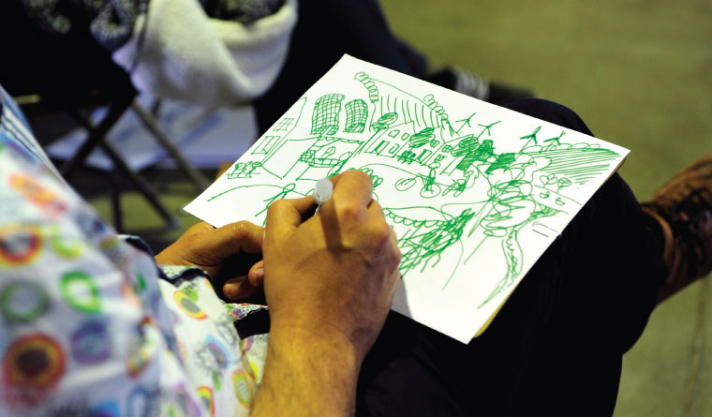
Jean-Louis Lamboray is hosting gatherings which inspire community members to dream their desired futures into being. The above image is from an event in Grez-Doiceau, Belgium. (Photo: Jan Somers)
Trapped in the snarl of traffic in Lille near the Belgian border due to new security measures a few days ago, Jean-Louis Lamboray lit up when his Spanish-speaking friend’s slip of the tongue cast the situation in a whole new light as she called it a “state of emergence.”
Jean-Louis has now been inspired to lift this up as a key message. “Yes, we have emergencies, but let’s declare a state of emergence,” he says in a Skyped conversation with Axiom News.
|
The referenced media source is missing and needs to be re-embedded.
|
|
Hostage to the ‘Emergency’
A resident of the village of Grez-Doiceau, about 40 km from Brussels, Jean-Louis is upset about the loss of freedom people experienced when the federal government essentially shut down the Belgian capital as a security measure after the Paris terrorist attack. “We’re basically being locked up in our houses,” he says, adding the influx of army tanks is being seen by many as more of a gesture than useful response to the terrorist threat.
In the City of Brussels alone, more than 50 million Euros have been lost per day due to the constricting of freedom.
“That’s just economic loss; how about me playing tennis with three 70-year-olds and being told we are under threat by terrorists and we have to stop playing and go back home?” Jean-Louis says.
“They’re not trusting the capacity of citizens to go on with their lives.”
“While the government invokes the principle of caution to support the shutdown, it was oblivious to the same principle when it decided during the same days to continue running obsolete nuclear plants for another 10 years,” Jean-Louis adds.
Declaring a State of Emergence: Dreaming as a Community
So what could it look like declare a state of emergence? Jean-Louis suggests it’s first and foremost, about what’s already been started in his village Grez-Doiceau — creating the space for citizens to dream together about their deep aspirations for the future.
“And let’s not sit back and say, ‘Where is the dreamer? No, no, LET US dream.”
Jean-Louis has travelled the world as a pioneer of an approach intended to support communities in drawing on their own resources and strengths to create local responses to issues such as AIDS, Ebola, malaria and domestic violence.
|
The referenced media source is missing and needs to be re-embedded.
|
|
| Grez-Doiceau, Belgium (Photo: Jan Somers) |
Last year he was inspired to bring this approach home to his village and organized a citizen meeting with the support of the local chapter of Transition Town.
The gathering was centred on an invitation for citizens to create a collective dream for their village and then identify actionable ways to bring that dream to fruition — with or without the support of local government.
“What are the small feasible actions we can do?” was a guiding question.
From that gathering, a number of community-building activities emerged, from a designated time at the local clinic for mothers with babies to come and chat with each other to a local concert intended to connect youth, as well as others.
The gathering acted more as a quiet seeding of desire and small actions than an enabler of whole-system change.
But Jean-Louis is hopeful about what it has unleashed in terms of people taking more active ownership of their village’s future.
When he learned of a recent gathering in Peterborough, Ontario, Canada that was intended to also unleash local citizenship that hope suddenly brightened. What might happen through conversation between these two communities to learn from, support and inspire each other around this shift, he’s now asking?
Declaring a State of Emergence: The Role of the Political Sphere
So declaring a state of emergence includes enabling citizens to act on their own agency in order to realize their collective dream.
|
The referenced media source is missing and needs to be re-embedded.
|
|
| Grez-Doiceau, Belgium (Photo: Jan Somers) |
It also includes demanding political powers effectively support emergence, which necessitates shifting the ethos of the political sphere, Jean-Louis says.
“The provident state is atomizing people because they provide everything — they supplant, they replace what we do for each other in families and neighbourhoods… and all kinds of resources go untapped,” Jean-Louis says.
“We have to support communities acting by themselves — that is a total shift in mindset by the politicians. They have to relinquish control — whether it’s (in response to) AIDS, Ebola, global warming or terrorism.”
Being a full citizen also includes embracing spirituality, Jean-Louis adds, noting it’s a disturbing reflection that the iPhone 6 seems to be held up as a foremost purveyor of meaning, purpose and excitement in today’s society.
“This is reaffirming the need to open the agora — the space for people to express their deep aspirations — and rebuild democracy on what is common rather than the differences,” Jean-Louis says. “There is so much action that can be taken on things that people are in agreement about.”
So what if we did declare a state of emergence, rather than emergency?
Related Blog:
Let Us Decree the State of Emergence
You can comment on this story below, or e-mail michelle(at)axiomnews.com.





